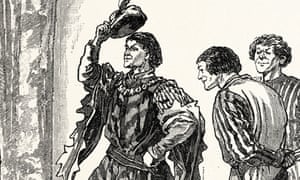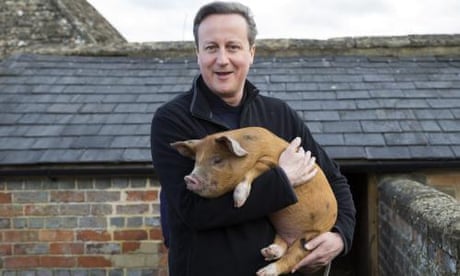 An unofficial biography alleges that British prime minister took part in bizarre ritual at the Piers Gaveston Society, reported to encourage ‘ostentatious decadence’
An unofficial biography alleges that British prime minister took part in bizarre ritual at the Piers Gaveston Society, reported to encourage ‘ostentatious decadence’
Picture depicting Piers Gaveston, the alleged lover of Edward II. The society that bears his name was formed at Oxford in 1977. Photograph: Universal History Archive/UIG via Getty Images
What have we learned about David Cameron today?
An unofficial biography of David Cameron written by the Conservative donorLord Ashcroft contains a series of allegations. They include that the prime minister spent time in a drug-taking environment at university, that he took part in a bizarre dinner club initiation ritual, and another claim about Cameron’s knowledge of the peer’s offshore tax status.
One specific allegation is that, in the words of the Daily Mail, Cameron took part in an initiation ceremony in which he “put a private part of his anatomy” into a dead pig’s mouth. It cites a source – a current MP – who claims to have seen photographic evidence. It allegedly took place at a notorious Oxford University drinking club, the Piers Gaveston Society.

From #piggate to #Hameron: how Twitter reacted to David Cameron claims
Downing Street has declined to comment on the book but a Conservative source said No 10 did not recognise any of the allegations made on the front page of the Daily Mail.
What is the Piers Gaveston Society?
“Piers Gav” is highly exclusive, made up of a self-selecting group of 12 undergraduates. The men-only club, named after the alleged male lover of Edward II, king of England from 1307 to 1327, was founded in 1977 and carries the motto: “Fane non memini ne audisse unum alterum ita dilixisse.” It translates to:
Truly, none remember hearing of a man enjoying another so much.
The Mail reports that the club encourages “excess, high camp [and] ostentatious decadence”.
Piers Gaveston members are understood to be given obscure titles such as “Poker”, “Despenser” and “Catamite”, and they all follow the Sicilian code ofOmertà – or maintaining silence about the club. In fact, it prides itself on being a clandestine organisation.
What do people say about it?
Valentine Guinness, one of the founders of the society, once told the journalist Toby Young that the appearance of Piers Gav and other similar societies in the 70s “was a conscious effort to say, look, you know, the country may be in a mess but we’re still going to have a good time”.
And so they do. For its summer ball, members each invite 20 guests – preferably more women than men, who were last year given 72 hours’ notice, when they were told to turn up for a hired coach that would drive them to an undisclosed destination in the countryside. “Cross-dressing is as likely to feature as speed-laced jelly,” says the Telegraph of these parties. “The rules are simple – there are none.”

Cameron biography: Ashcroft makes new debauchery claims about student days
The journalist Danny Kemp went to the Piers Gaveston ball in summer 1995. He has a different take on the club. “I guess the first thing to say is that it really wasn’t very debauched,” he said. “I was invited by a friend of a friend who was in the Piers Gaveston Society. The most obvious thing is that it is meant to be raunchy fancy dress. This means a lot of people going in drag [myself included unfortunately], others in what back then looked like bondage-type gear.
“Invitees were told to gather in a central Oxford location, where a coach picked everyone up and drove them to a location in a field on the outskirts of the city. There was a big marquee in the field, with what was again meant to look like louche decor, velvet, etc, and bowls of free punch to drink. I think they had some kind of burlesque-type dancing on a stage, but it was mainly just 90s house, techno and people dancing, in drag.
Advertisement
“I was expecting it to be a bit more interesting than it was. And, really, that was it. No pigs’ heads. The whole thing really seemed like not-terribly-debauched public schoolboys’ idea of debauchery.”
The broadcaster Julia Hartley-Brewer went to Piers Gaveston parties in 1989-91. She said they were “just big, fairly wild parties. Lots of drink, lots of very rich posh kids getting wasted – probably lots of drugs [but not my thing so I wouldn’t know]. They were fun bashes – very hot and sweaty and very much about getting off with people.”
Jules Evans, author of Philosophy for Life: And Other Dangerous Situations and policy director at Queen Mary’s Centre for History of Emotions, was a member of Piers Gaveston in 1997. He said it was not a secret society, rather just a club that organised a summer party. “They were pretty innocuous – basically a fancy dress rave. Not nearly as decadent as the media or the participants themselves liked to think. Didn’t stop the Sun sending a reporter and photographer and calling it an ‘orgy’,” he said.
What’s the difference between Piers Gaveston and the Bullingdon Club?
The Bullingdon Club is the other drinking society Cameron was known to be a member of. Most of the sonorous members of the Bullingdon are old Etonians. The prime minister was one such member, as were the London mayor, Boris Johnson and the chancellor, George Osborne.
They wore a bespoke uniform of tailcoats, waistcoats and bow ties, which could cost thousands of pounds, making membership difficult for ordinary students. One MP who was once asked to join the club said he walked out of a gathering in disgust. “What it basically involved was getting drunk and standing on restaurant tables, shouting about ‘f***ing plebs’. It was all about despising poor people,” he told the Daily Mail of the scene reminiscent of film The Riot Club, based on Laura Wade’s play Posh.
Advertisement
There is no evidence that Cameron, Osborne or Johnson were involved in the excesses described by the MP.
The Bullingdon is still banned from meeting within a 15-mile radius of Christ Church after members smashed 400 windows at the college in 1927. When Evelyn Waugh published his novel Decline and Fall the following year, he probably did not expect Oxford’s secret drinking club the Bullingdon, or Bollinger as it is satirised in the book, to still be filling headlines in decades to come.
For Waugh, the club consisted of “epileptic royalty from their villas of exile; uncouth peers from crumbling country seats; smooth young men of uncertain tastes from embassies and legations; illiterate lairds from wet granite hovels in the Highlands; ambitious young barristers and Conservative candidates torn from the London season and the indelicate advances of debutantes; all that was most sonorous of name and title”.
http://www.theguardian.com/
http://www.theguardian.com/

Δεν υπάρχουν σχόλια:
Δημοσίευση σχολίου